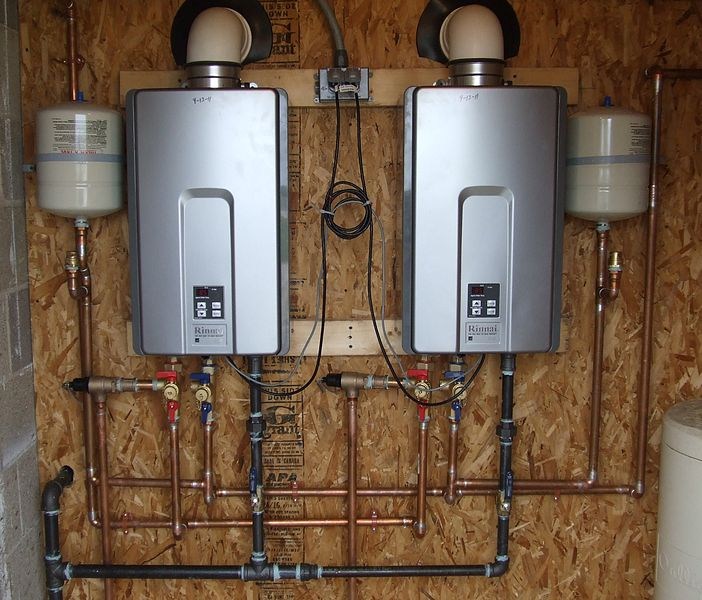Exactly How to Select the Right Water Heating Unit Installation for Your Home
Picking the ideal water heating unit setup for your home requires a thorough understanding of various variables, including your family's details warm water demands and the types of heaters available. Additionally, factors to consider around power performance and setup costs play a vital function in the decision-making process.

Assess Your Warm Water Demands
Analyzing your warm water demands is essential for picking a proper water heating system that efficiently satisfies your home demands. To begin, take into consideration the variety of owners in your home and their day-to-day regimens, as these aspects substantially affect hot water usage. Bigger houses commonly call for greater warm water capability for activities such as showers, washing, and dishwashing.
Identify when your family calls for the most hot water concurrently. In addition, take into consideration the certain devices and components that eat hot water, consisting of washing makers, dish washers, and taps.
It is also necessary to make up any kind of future changes in your household, such as extra household members or changes in way of life that might enhance hot water demand. Evaluate the power efficiency of possible water heating system options, as this can considerably influence lasting operating costs. By completely evaluating these elements, you can make an educated decision that straightens with your warm water needs and advertises efficient energy use in your home.
Check Out Various Water Heater Types
When checking out different water heating unit types, it's important to comprehend the different choices offered and their one-of-a-kind attributes. One of the most usual types include container hot water heater, tankless hot water heater, warm pump hot water heater, and solar water heaters.
Container water heating units are conventional systems that store a particular volume of warm water, making them appropriate for homes with constant need. Nevertheless, they can run out of warm water throughout height usage.
Tankless water heating systems, on the various other hand, heat water on demand, offering an endless supply. They are optimal for smaller sized spaces and can be extra energy-efficient, however might call for a higher ahead of time investment.
Heat pump water heating systems use electrical energy to move warmth from the air or ground, making them efficient options in modest climates. They can be much more complicated to mount and may require extra room.
Lastly, solar water heating systems harness sunshine to heat water, using a green choice. They require a considerable preliminary investment and are reliant on sunny problems yet can dramatically decrease energy prices with time.
Each kind has distinctive benefits and considerations, making it essential to review which best fits your family's requirements and preferences.
Take Into Consideration Power Effectiveness Rankings
Comprehending the numerous types of water heaters normally brings about the factor to consider of their power performance rankings. Energy effectiveness is a crucial consider selecting a water heating unit, as it directly influences your utility expenses and the ecological footprint of your home. Hot water heater are generally ranked making use of the Power Aspect (EF) or the newer Uniform Energy Factor (UEF) metrics, which quantify their efficiency by measuring the energy taken in versus the hot water produced.

It is additionally important to assess the Energy Star qualification, which indicates that a hot water heater satisfies rigorous efficiency requirements. Choosing a water heating unit with a high power performance rating can not only decrease your energy prices however likewise improve the overall convenience of your home, making it an important facet of the decision-making procedure.
Evaluate Setup Costs
Evaluating installation expenses is a vital step in the option process for a water heating system, as it encompasses not only the cost of the unit itself yet additionally the expenses connected with its installation. It is necessary to obtain comprehensive price quotes from numerous specialists to ensure a detailed understanding of possible expenses. This consists of labor fees, any necessary licenses, and products required for the setup.
When analyzing installation costs, consider click here now the complexity of the setup process. Elements such as the area of the water heater, existing pipes facilities, and whether the setup includes changing an old system or mounting a brand-new system can significantly influence complete expenditures. Retrofitting an existing room may incur extra expenses contrasted to a simple setup.
Furthermore, bear in mind the lasting effects of installment prices. Some water heating units may have greater ahead of time setup expenses yet offer better energy effectiveness, causing financial savings on power expenses with time. Inevitably, an extensive analysis of setup expenses, combined with an understanding of the device's long-lasting performance, will assist you in making an educated choice that straightens with your budget plan and requirements.
Testimonial Maintenance Needs
Normal upkeep is important for guaranteeing the longevity and efficiency of a hot water heater. This process typically entails routine assessments, cleaning, and necessary adjustments to keep the unit in optimum working problem. Property owners should set up yearly specialist maintenance, which includes examining the anode rod, purging the storage tank to remove sediment accumulation, and inspecting the stress safety valve.
For tankless water heating systems, maintenance concentrates on descaling the system to avoid mineral buildup, particularly in locations with hard water. Furthermore, it is essential to check and clean filters routinely to maintain proper water circulation.
Homeowners ought to likewise execute routine visual assessments, trying to find signs of leaks, corrosion, or uncommon noises, which may indicate underlying issues. water heater. On a regular basis examining the temperature level and stress safety valve is likewise important, as a malfunctioning shutoff can lead to unsafe pressure accumulation
Last but not least, adhering to the supplier's specific maintenance guidelines is essential. These standards usually include suggested upkeep periods and specific tasks to guarantee the system operates effectively and safely. By sticking to appropriate upkeep protocols, homeowners can prolong their water heating look at these guys unit's life expectancy and improve its performance, ultimately saving money on power costs and minimizing the probability of costly repair services.
Final Thought
Choosing the suitable water heating system installation necessitates an extensive evaluation of family hot water demands, the evaluation of numerous types of hot water heater, and consideration of power efficiency rankings. In addition, an analysis of setup prices and upkeep responsibilities is important for making certain ideal performance and longevity. By sticking to these standards, house owners can make educated decisions that not only deal with immediate demands however additionally promote long-term power performance and cost-effectiveness in water home heating options.
Selecting the suitable water heating system setup for your home requires a thorough understanding of various elements, including your household's details hot water demands and the types of heating systems offered.Assessing your hot water requirements is crucial for choosing an appropriate water heating system that successfully meets your house demands. Water heating units are generally ranked using the Power Factor (EF) or the newer Attire Energy Aspect (UEF) metrics, which evaluate their effectiveness by gauging the energy taken in versus the warm water produced.
Some water heating systems might have higher ahead of time installation costs yet offer better power effectiveness, leading to cost savings on power bills over time. water heater.Selecting the appropriate water heating unit installment demands a comprehensive analysis of household hot water demands, the assessment of various types of water heating systems, and factor to consider of power effectiveness rankings